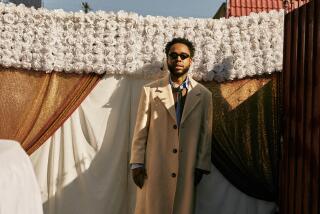Playing Strings of Tradition
- Share via
Like any rabble-rousing folk musician worth his saber, British singer-guitarist Martin Carthy has periodically made the effort to rattle the high and mighty--especially his nation’s Tory government. And what’s it gotten him?
A medal.
In July, Queen Elizabeth II bestowed upon him the Order of the British Empire (MBE) Award, the same honor she had granted the Beatles decades earlier.
“My first reaction was, ‘Wow, this is very nice,’ ” Carthy said by phone recently from a friend’s home in L.A. “My second reaction was, ‘Do I really want this thing?’ I’m not a supporter of imperialism of any kind, and I sure wish the award was titled something like ‘The Legion of Honor.’ ”
“On the other hand,” said Carthy, who plays a rare solo gig Sunday at Shade Tree Stringed Instruments in Laguna Niguel, “it’s good indeed that the government recognizes contributions in the arts, and in my case, 40 years of bloody hard work.
“In addition, the MBE really came from below. . . . It’s a people’s award. Your average blokes actually lobby for recipients through letters and whatnot. In fact, this guy in Scotland had been petitioning on my behalf for about three years. So it would be stupid to not accept it, really.”
The 58-year-old Carthy, who was born in Hatfield, Hertfordshire, England, and now lives in Robin Hood’s Bay, North Yorkshire, helped usher in the English folk revival of the 1960s.
Although still not widely known in the U.S., Carthy not only is regarded as one of the best interpreters of traditional English folk songs, but his distinctive guitar playing--a stirring, crackle-and-pop style of striking the strings--has influenced the likes of Bob Dylan, Paul Simon and Martin Simpson, among others.
His latest release, “Signs of Life,” is a solo project, but he has spent the bulk of his career working in a variety of group and duo settings.
He began a musical partnership with fiddler Dave Swarbrick in 1966. Carthy also was a member of Steeleye Span and the Albion Country Band in the early ‘70s and was a founding member of the quirky, horn-powered Brass Monkey.
Most recently, he has toured and recorded as Waterson: Carthy, a family affair featuring Carthy, his wife, singer Norma Waterson; the couple’s 25-year-old daughter, fiddler Eliza Carthy, and their melodeon-playing son-in-law, Saul Rose.
The collaborative process, Carthy says, often triggers the greatest innovation.
“If your solo act is together, and has any kind of momentum, then you bring this self-confidence and energy into the group dynamic,” he said. “What that allows you to do is invent in a way that you otherwise could not.
“It’s like with Brass Monkey--nobody thought of having brass players in a folk band. It just kind of happened organically. I remember when we first started playing, [accordionist-singer] John [Kirkpatrick] and I just started laughing because of the racket [from the horns] going on all around us. But it was ripe for development, and over time--and much rehearsing--it blossomed in something quite special.” (Brass Monkey reunited and released “Sound & Rumour” in 1997 and, Carthy says, plans to record again.)
Waterson: Carthy, in particular, has forced Carthy to listen to old songs with fresh ears.
“Eliza started singing a lot of the folk songs I used to sing, and I noticed how, all of a sudden, they were so different from what I remember,” he said. “It’s her attitude more than anything else, where she approaches a melody line or a verse in a way I never dreamed of. That’s where I learn from her, and it’s exciting . . . a very healthy thing for our personal and professional relationship.”
That spirit abounds in “Signs of Life,” Carthy’s first solo release in a decade. He describes the 13-song collection as “a journey through the musical signposts of my life,” one that courses from traditional folk songs to some seemingly improbable pop, rock and jazz numbers. Among them: “Heartbreak Hotel,” the Bee Gees’ “New York Mine Disaster, 1941,” Hoagy Carmichael’s “Hong Kong Blues” and Bob Dylan’s “The Lonesome Death of Hattie Carol.”
One of the traditionals, “Prince Heathen,” is about an evil prince who beats, imprisons, rapes and impregnates a defiant, strong-willed young woman. He demands that she love him, but she spurns him time and again. In the original version--which Carthy recorded with Swarbrick in 1969--the woman finally relents and falls in love.
“That ending is insulting. . . . It’s utter nonsense,” Carthy said. “So I ditched that final verse and just sang the refrain: ‘Never yet, you heathen dog, and never shall for you!’
“It’s strange how you can miss something the first time around, and then suddenly it hits you like a door in the face,” he said. “Now, there is truth in that song, and that is what interpreting songs is all about.
“Folk music will only survive if we take it places where it resonates the deepest, where it can thrive and remain interesting,” he said. “That means twisting and shaping songs . . . taking hold of them as your very own. It’s like Dave [Swarbrick] once told me: ‘You can do anything to music, and it won’t mind.’ ”
* Martin Carthy plays Sunday at Shade Tree Stringed Instruments, 28062 Forbes Road, Laguna Niguel. 7 and 9:15 p.m. $20. (949) 364-5270.
More to Read
The biggest entertainment stories
Get our big stories about Hollywood, film, television, music, arts, culture and more right in your inbox as soon as they publish.
You may occasionally receive promotional content from the Los Angeles Times.









